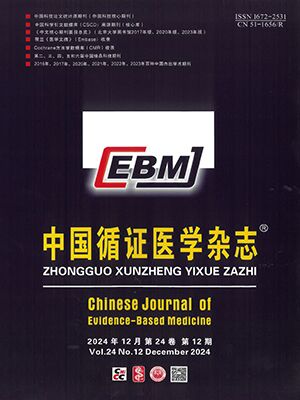Objective To evaluate the diagnostic value of serum pro-gastrin-releasing peptide (Pro-GRP) in patients with small cell lung cancer.
Methods We searched MEDLINE, EMBASE, The Cochrane Library and other databases (1966 to Sept 2009) to collect studies which evaluated the diagnostic value of Pro-GRP in patients with small cell lung cancer. The heterogeneity of the included studies was tested by the Cochrane Collaboration’s software RevMan 4.2. The Summary Receiver Operating Characteristic (SROC) curve and meta-analyses were performed by MetaDisc.
Results A total of 256 relevant articles were retrieved and 19 were included in our review. Eleven studies involving 1 447 patients were included. Meta-analyses showed that the heterogeneity among studies was high (P﹤0.000 01, I2=69.3%), the pooled sensitivity was 0.717 and the pooled specificity was 0.963. Subgroup analyses indicated that 9 of the studies which used the LD (Limited diseases) SCLC group (P=0.003, I2=65.5%, SEN=0.637, SPE=0.968, SROC AUC=0.724 3) had heterogeneity and ED (Extensive diseases) SCLC group (P=0.2, I2=27.0%, SEN=0.766, SPE=0.968, SROC AUC=0.935 5) had no heterogeneity. And 15 of the studies of Pro-GRP which were determined by acmmercial sandwich ELISA (Japan) group (P=0.000 1, I2=68.5%) had heterogeneity. Three of the studies of Pro-GRP which were determined by ELISA (Germany) group (P=0.948 7, I2=0.001%) had no heterogeneity.
Conclusion Pro-GRP could be regarded as one of the reference tests in patients with small cell lung cancer, but higher quality trials are required.
Citation: MA QingGuang,DENG Jiajia,SHEN Li,LI Huimin. Diagnostic Value of Serum pro-gastrin-releasing peptide (Pro-GRP) in Small Cell Lung Cancer Patients: A Systematic Review. Chinese Journal of Evidence-Based Medicine, 2010, 10(7): 869-874. doi: 10.7507/1672-2531.20100509 Copy
Copyright © the editorial department of Chinese Journal of Evidence-Based Medicine of West China Medical Publisher. All rights reserved




